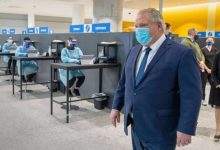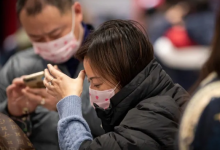Travellers at Pearson to be asked about coronavirus amid pneumonia outbreak in China
Travellers to Toronto’s Pearson International Airport will soon be asked a question about a new coronavirus that has caused a pneumonia outbreak in China.
Dr. Theresa Tam, Canada’s chief public health officer, told reporters on Monday that travellers will be asked a screening question at electronic immigration kiosks if they have travelled to areas affected by the coronavirus in the last 14 days and they will be reminded to report flu-like symptoms to border services agents.
There will also be messaging on arrival screens about the coronavirus, Tam said.
“The Chinese lunar year is coming so out of an abundance of precaution that’s why we are putting out additional information for travellers,” Tam said.
Federal public health officers will also post signs about the coronavirus, known as 2019-nCoV, at Vancouver International Airport and Montréal-Trudeau International Airport.
According to the official Chinese Xinhua News Agency on Monday, 224 cases of pneumonia caused by the new coronavirus infection have been reported in China. Of that number, 217 have been confirmed. China has reported four deaths.
China has confirmed human-to-human transmission in the outbreak, which began at a seafood market in the city of Wuhan in central China. Cases have since been reported in Japan, Thailand and South Korea.
The virus belongs in the same family of coronaviruses as Severe Acute Respiratory Syndrome (SARS), which killed nearly 800 people globally during a 2002-03 outbreak that started in Guangdong, China. In Canada, 44 people died, many of them health-care workers.
Symptoms of 2019-nCoV are mainly fever, with a few reports of people having difficulty breathing, and chest x-rays showing signs of pneumonia in both lungs.
According to the World Health Organization, signs of infection can include respiratory complaints, fever, cough, shortness of breath and breathing difficulties. In more severe cases, infection can cause pneumonia, SARS, kidney failure and even death. The only way to confirm 2019-nCoV is with a lab test.
Canada has has no direct flights from Wuhan, and the number of travellers arriving indirectly from Wuhan is low. The overall risk of disease spread to Canada is considered low, the Public Health Agency of Canada has said in a statement on the weekend.
An expert in Toronto, however, says the spread of the coronavirus needs to be closely watched.

Dr. Kamran Khan, an infectious disease physician, and founder and CEO of the digital health company BlueDot, said officials do not yet know fully how the coronavirus is spread and no vaccines are available. He said BlueDot, founded six years ago, is working on better ways to detect and respond to infectious disease threats.
Khan said airport screening is “not the most efficient strategy.” Travellers are far more likely to get sick after they leave the airport, he said. The “real front-lines” are emergency departments, but education for travellers is still important, he added.
“We’re in a world today where people can easily jump on a plane and go halfway around the world in a matter of hours,” Khan said on Monday.
“And we are also just at the precipice of the Lunar New Year, when we’re anticipating there will be a mass migration of people and gatherings and congregations where this disease could potentially propagate,”
Toronto company tracking spread of coronavirus
His organization is tracking the spread of the coronavirus to other countries and monitoring the outbreak of pneumonia in China. He said it is no longer about animal-to-human transmission, but instead human-to-human transmission.
“SARS had a mortality rate somewhere around 10 percent,” he said. “I think it still remains to be seen: Is this as deadly as SARS, or if this going to be is a milder illness?”
Khan said the coronavirus has the hallmarks of SARS, including the fact that it spread from markets to people, it has human-to-human transmission, it has infected health workers and there has possibly been what he called a “super spreading event.” But officials don’t yet know how severe it is, he added.
“SARS had an important impact here in Toronto,” he said. “That was no small event.”
According to Tam, Canada has had no confirmed cases of 2019-nCoV. Three people in Canada who travelled to Wuhan were investigated for the virus, but the results came back negative.
The World Health Organization (WHO) will hold an emergency meeting on Wednesday to discuss whether the new coronavirus identified in China constitutes an international health emergency.
CBC








Redes Sociais - Comentários